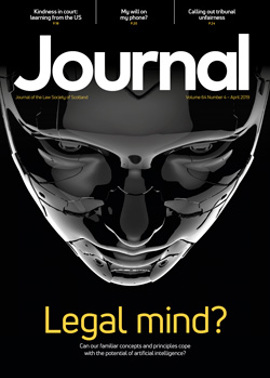Opinion: Allan Jamieson

Readers with longer memories may recall our article “Show us the files” (Journal, February 2011, 8), where we highlighted the sharp contrast between the disclosure regime for scientific evidence in other countries and the restrictive regime in Scotland.
Why is Scotland’s state forensic laboratory the most secretive we have ever dealt with? State owned and operated, yet more resistant to disclosure to the defence than any other civilised jurisdiction we have worked in (USA, Australia, New Zealand, England, Northern Ireland, Ireland). It is a disgraceful situation which threatens to create repercussions on a Cadder scale if the highest courts decide that Scotland should adopt the fair practices used routinely elsewhere.
Once upon a time, Scotland’s four forensic science laboratories provided the defence expert on request with colour copies of the case files containing the observations and results of their work. Never have we received those files since the creation of the Scottish Police Authority (SPA).
Once again we feel the need to raise this issue as the SPA introduces new software used to provide a statistic in DNA cases. Naturally, we asked to see the validation data which would show that the software actually worked. Unsurprisingly (based on our experience), the SPA refused.
We wrote to the Scottish Government last September to request that it instruct the SPA to release information about the testing of the new software. As we further understood that the SPA intended to spend public money instructing counsel to seek to have such disclosure blocked, we also asked: “In whose interest can it be to keep the validation secret? What is within the data that the defence should not see? Why is public money being spent to avoid scrutiny of a public body which is supposedly serving the public?”
The Government stonewalled this, referring to a petition seeking some of this information on behalf of an accused in August 2018 but which was dismissed by the sheriff, and adding: “As the subject matter of your request has been considered and dismissed in law, I am unable to help you.”
As we noted in reply, the issue is one not of law but of fairness. A single dismissal by a sheriff does not make it illegal for the scientific data held by the SPA, and being used in prosecutions, to be released for proper scrutiny by the scientific community.
We repeated the unanswered questions from our initial email, and in addition asked for confirmation that the Cabinet Secretary for Justice had sight of that email and specifically approved the response. We trust the fair-minded member of the public would agree these are reasonable questions that deserve an answer. However all we received was: “There is nothing that I can add to the previous reply.”
Really? You cannot even say whether the minister was made aware of our letter? You cannot say what we shouldn’t see?
This episode is simply the latest in the ongoing obstructive and unfair approach apparently adopted by the entire Scottish system. The Crown Office & Procurator Fiscal Service (COPFS) stands meekly aside, pleading that since it doesn’t have the files, it cannot provide them, and apparently unwilling to force the SPA to do so.
Under the Criminal Justice and Licensing (Scotland) Act 2010, s 116 the police are under an obligation to submit all relevant information to the Crown. The court in Smith v HM Advocate 1952 JC 66 set out that it is their duty “to put before the procurator fiscal everything which may be relevant and material to the issue of whether the suspected party is innocent or guilty. We repeat, it is not for the police to decide what is relevant and material but to give all the information which may be relevant and material”.
COPFS should therefore expect all relevant information to be provided to it. In terms of its own prosecution code, “the prosecutor must consider what action is in the public interest. Assessment of the public interest often includes consideration of competing interests, including the interests of the victim, the accused and the wider community”.
We say that those interests are best served by a fair trial with full disclosure of the relevant information. COPFS, and the Scottish Government, should become active in ensuring fairness. Defence solicitors need to be more active in challenging this idiosyncratic system on behalf of their clients, and justice.
Despite Government claims that Scotland has one of the best, if not the best, criminal justice systems in the world, we at The Forensic Institute know that it has the most restrictive disclosure regime for forensic scientific evidence in the advanced world.
This is simply the latest in a long, frustrating campaign on our part to achieve change. Our recent, and longrunning, correspondence with the Scottish Government is on our website, with a longer version of this article at www.theforensicinstitute.com/update-on-disclosure-2019
In this issue
- Time to promote shared care?
- Client medical records: a matter of right
- Search for the route to healing
- Rights after “same roof”
- Are you a qualified creditor?
- Reading for pleasure
- Opinion: Allan Jamieson
- Book reviews
- Profile: John Laughland
- President's column
- ScotLIS update
- People on the move
- Common law and artificial life
- FAIs: addressing the concerns
- Challenging times
- Shared humanity
- Cases of the paperless will
- How to manage your legal practice for success
- Fairness v Convenience
- Moorov then and now
- Personal licences: the uncertainty continues
- Is Airbnb use a planning matter?
- Insolvency Rules: a positive realignment
- IR35 compliance moves up the ladder
- “Best interests” in the balance
- Scottish Solicitors' Discipline Tribunal
- PSG tackles index-linked rent reviews
- Finding the right seat
- Public policy highlights
- Accredited paralegal update
- Events, and more, for members
- Accredited Paralegal Committee profile
- Second thoughts on executor declarations
- Client communication – a continuous journey
- Reflections from the Commission
- Love my tender
- Ask Ash






